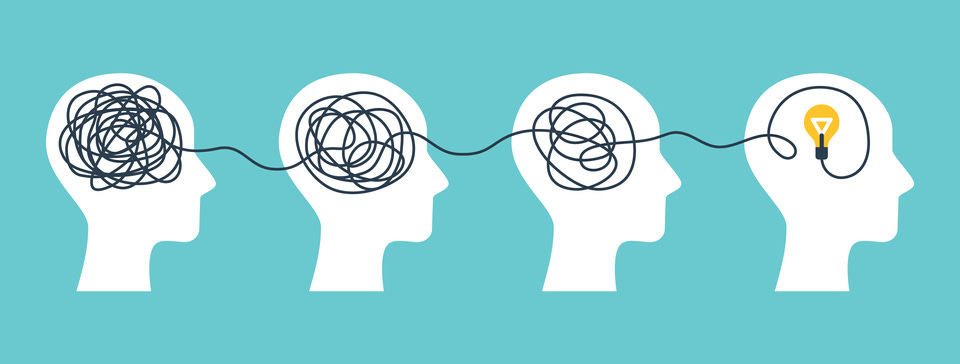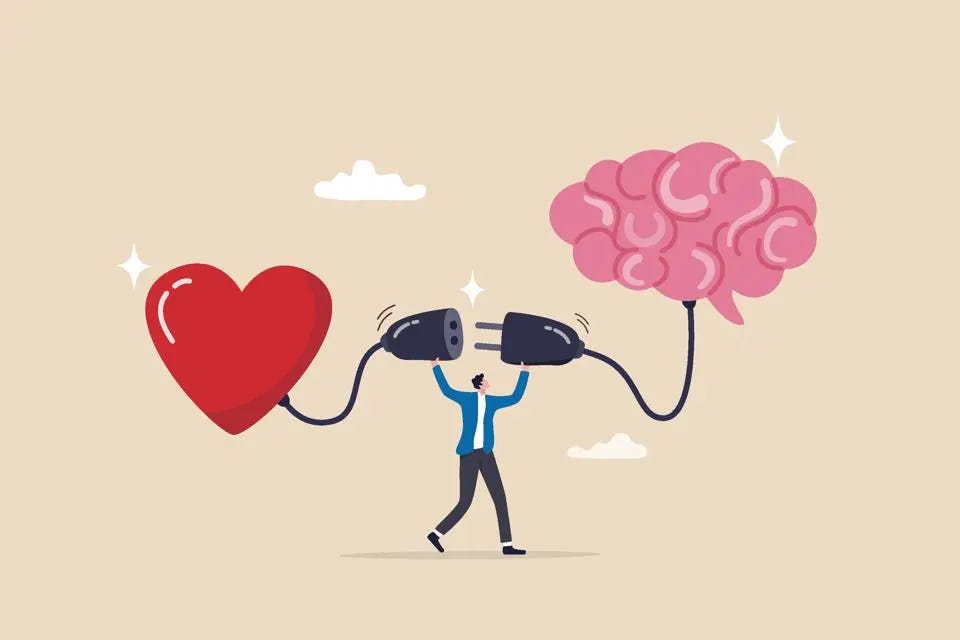It is very important to understand that emotional intelligence is not the opposite of intelligence, it is not the triumph of heart over head- it is the unique intersection of both.
David Caruso
Hello bugs,
This week, I would like to invite you to consider the paradigm between IQ (intelligence quotient) and EQ (emotional intelligence) with me.
As (recovering) people-pleasers, we may have grown up in environments where IQ held more value than EQ. It’s also possible that as (recovering) people-pleasers we believe that we all have spectacular EQ due to our ability to empathize. If that sounds like you, you’re not alone! In 2017, when I first purchased Emotional Intelligence 2.0, I too, thought I was the queen of EQ without caring to understand the first or second pillars of it (self-awareness & self-management). I viewed EQ as the ability to tune into other peoples' emotions and facilitate the support needed of that individual at any given moment. While understanding and managing the emotions of others is part of EQ, only a people-pleaser would feel that it’s the only part that matters. As we are learning here- practicing EQ is a different kind of intelligence- and it doesn’t place all its focus outwardly- as pleasers do. If practiced fully, integrating all four pillars, pleasers can learn to still care for others, while maintaining a sense of self-care, first.
It’s quite possible that many of us recovering pleasers seek to please in terms of achievement- which can require higher IQ. Let’s start there:
According to the Association for Psychological Science IQ is measured in two ways:
Fluid Intelligence
Crystallized Intelligence
Fluid Intelligence is our ability to problem solve, think outside of the box, and our ability to reason in an abstract way.
Crystalized Intelligence is our ability to read and comprehend, and learn new skills.
While we’re at it, let’s also dust off our understanding of Emotional Intelligence as defined by Harvard Business School:
EQ is the ability to understand and manage one’s own emotions, as well as recognize and influence the emotions of those around you.
Growing up, I didn’t realize that such thing as EQ existed. In school back then, high IQ was praised, and the “soft skills” of emotional intelligence, empathy, and communication, were simply “nice-to-have’s”.
As an adult, I have observed that the same is true of the corporate world. External achievements, productivity, sales, budget savings, data driven results- are what recruiters scan for in resumes (working in talent acquisition- I know this to be true), and hiring managers covet. If you have ever read a book- which I am assuming you have if you are spending your free time here with me- think about the Author’s About Me page. What is typically highlighted there? Accolades. Accomplishments. Number of books sold, celebrity status influence; all to prove that the author matters. Soft skills are backstage, lurking as underlying expectations to all the success- but these skills don’t require spotlight on a resume, an annual performance review, or About The Author sections.
We have thought leaders, with doctorate degrees and access to academic research- like Dr. Brene Brown, Adam Grant, Psychotherapist Farah Harris, Simon Sinek, and many others, dropping truth bombs on our daily newsfeeds: SOFT SKILLS ARE NECESSARY. SOFT SKILLS ARE NOT ACTUALLY SOFT. THEY ARE NOT INHERENT. WITHOUT THESE SKILLS, WE ARE DOOMED!
Bonus Material —> Four min clip: Stop Calling Them Soft Skills - Simon Sinek
Even with this research, even with widely known and respected leaders preaching the importance of human skills, most of us still covet the tangibles of IQ. This leads me to ask the proverbial question… are we EQ people, stupid?
Why do we care so much more deeply about the cold hard facts? The achievements, and external validation?
Jesus Christ, Mother Teresa, Prophet Muhammad (may peace & blessings be upon him as my husband would add here), The Buddha, Mary Magdalene, Kuan Yin, Saint Francis of Assisi, Goddess Lakshmi … our history of a divine humanity proves that compassion, relationship building, ethics, and general kindness are essential to life, so why did we forget? Why do we value high IQ so much more?
Before you start to think that I don’t care about the genius’, I realize high IQ has advanced humankind- and I am not discounting the need for above average intellect.
What I am challenging, is the dark hole emotional intelligence has been hanging out in, for what seems like for centuries. As empathy is less about ego, and more about connecting- it seems EQ has agreed to take a back seat in the VIP hall of human attributes. Let this letter act as the duster, clearing off bunnies and mothballs from our human skills.
Did you know that there is a limit to your IQ? About a decade ago, researchers still believed that IQ could not be improved at all. Today, research explains that IQ can go up and down, but that there is a set biological range within each of us. If you are feeling skeptical (it’s fine- my IQ ain’t as high as my EQ) I’ll have the Association for Psychological Science back me up here.
The good news is that there is no limit to your EQ. Your skills in emotional intelligence can be developed- even as an adult!!
Why does this matter?
Well, EQ matters because human skills (not soft skills, remember?) matter. Harvard Business School offers an online certification for Emotional Intelligence in Leadership. I learned in that course that the most effective leaders, across all industries had one thing in common. Would you like to guess? It was EQ of course. Not IQ. It was the ability to not only be able to identify their own emotions and manage them on (and off) the job- but successful leaders are also tuned into the emotional status of their people. Knowing how others are doing, and- let’s elevate that knowing to actually caring- will create a sense of trust and loyalty in a team, which happens to be the recipe for success.
If you’re not a corporate leader you may think these human skills don’t apply to you. I’m here to say: Think again. Break free from corporate America’s minuscule definition of being a leader. You can be a leader as a parent. A volunteer, neighbor, sibling, or friend. You can lead colleagues, communities, or your cul-de-sac. Bringing forth a vision and influencing those around you to buy-in and work towards it- makes you a leader. Paycheck or not. Practicing EQ will enhance your relationships in all aspects. This is something I can promise.
Before we close, let’s pivot back to IQ for a minute:
Albert Einstein’s IQ was 160.
The average human’s IQ is between 85-115.
Einstein’s beautiful mind produced The Theory of Relativity among several other theories. Three inventions Einstein made possible today include:
Google Maps
The clock on you cell phone
Lasers
And while all these inventions have been pivotal to our advancement as a people- I have to wonder- who was Einstein’s other half? Those with high IQ, typically display lower EQ (think Sheldon Cooper from The Big Bang Theory), and that’s due to not being able to find shared interests with most of us “commoners” (Sheldon’s affectionate label for us). This creates isolation, which leads to loneliness. Loneliness can lead to depression. Loneliness is just as dangerous to our health as smoking fifteen cigarettes a day. (For my skeptics, here’s my source on that little factoid: click here).
I believe that Einstein had support. Perhaps not in the sense of another genius cracking the codes (although I did spot a few YouTube videos suggesting that his first wife, a mathematician, Mileva Maric is to thank for many of his inventions), but in an emotionally intelligent companion. Someone to understand his frustrations after a failed theory, to care about his feelings. It’s not necessary to understand the work, but the feelings Einstein felt on any given day. I wonder this about all successful, high IQ figures. Who was there for Steve Jobs? It’s time to let our EQ champions out of the shadows and celebrate their worth. May we know them, may we aim to be recognized as them. Our world needs both IQ and EQ, without one, there’s no progress in the other. It’s time IQ based minds embrace and celebrate their EQ support champions. And EQ support champs- let’s not forget to rally for the care of ourselves while we’re at it.
In today’s race to achieve the most, and be the smartest- let’s make a U-turn. Let’s be the group that decided to slow down. To recognize the paradigm between IQ & EQ - and the value of BOTH. Would you dare to pinky-swear and make a pact not to be stupid by forgetting the importance of emotional intelligence, ever again?
If we vow to practice the four pillars of EQ to embrace not only ourselves, but each other, life will rewards us with deeper meaning, sweeter moments, sudden value.
Take my hand and join us. <3
Digital Hugs,
K. Alexandra
Before you run!!
Check out these EQ Building Resources:
Join our Self-Care Support Group Thread! Meet other (recovering) pleasers, and carve out time to practice self-care (critical part of EQ!) Check it out and play here!
Do you have questions about emotional intelligence? Every other Tuesday, DPP alternates to our advice column, Ask A (Recovering) People Pleaser. What questions do you have about the Relationships in your life, Personal Development, or healing from people-pleasing? Submit to: Anonymous Google Forms or join the community chat below.
My Guided Emotional Intelligence Journal - with four sections dedicated to practicing ALL FOUR pillars of EQ is a great tool for beginners, click here to check it out. <3












EQ is so important for work and life. It's essential in tackling any change and bringing others with you. Lack of those human skills wrecks many a project! Love that you mention emotionally intelligent support and Mileva Marić . Have you read The Other Einstein by Marie Benedict?
This was really insightful! The Sheldon Cooper example made a lot of sense. I never considered him through this lens.